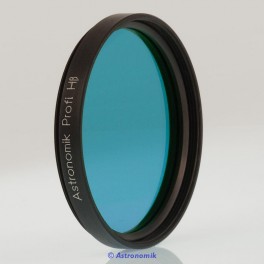 Ingrandisci
Ingrandisci Filtro Astronomik ASHB2 da 50.8mm
Astronomik
- Rimuovi questo prodotto dai miei preferiti
- Aggiungi questo prodotto ai miei preferiti.
- Stampa
Astronomik ASHB2 - H-Beta Filter - 2 inch
 Ingrandisci
Ingrandisci Astronomik ASHB2 - H-Beta Filter - 2 inch
Codice articolo: 8h0058
The Astronomik H-beta is a filter for visual observation of faint emission nebulae, in particular with instruments of larger aperture
♦ 97% transmission of the H-beta line
![Astronomik ASHB2 - H-Beta Filter - 2 inch [EN] Astronomik ASHB2 - H-Beta Filter - 2 inch [EN]](https://www.teleskop-express.it/img/cms/astronomik-hb-50.8.jpg) The Astronomik H-beta is a filter for visual observation of hydrogen nebulae, in particular with instruments of larger aperture.
The Astronomik H-beta is a filter for visual observation of hydrogen nebulae, in particular with instruments of larger aperture.It lets the light of the H-beta emission line pass nearly unhindered and blocks the remaining spectral range to the extent that the eye is dark adapted. By the use of the Astronomik H-beta filter, the contrast is increased so strongly that even the observation of the Horse Head Nebula with telescopes of 10" - 12" reaches the realm of possibility.
Main use:
The optimal aperture ratio for the use of the filter is 1:4,5 to 1:6. The range of application extends from 1:3.5 to 1:15. Transmission losses and chromatic distortions, which arise with other filters, are only apparent with the Astronomik filters when extremely fast aperture ratios of 1:3 and higher are used. The Astronomik H-beta filter will allow you to view large objects in the whole field of view of the eyepiece, even when using wide-angle eyepieces - not only in the center of the eyepiece. This filter should be used on telescopes with a diameter of 8" (20 cm) or larger. Smaller instruments do not gather enough light for meaningful and satisfying astronomical work. Due to the high optical quality of the Astronomik H-beta filter substrate, you will see the same needle-sharp stars as you would from your regular telescope.
Other uses:
♦ In the whole sky, there are few objects that benefit from the use of this filter in visual observation. On the other hand H-beta filters often decide about seeing or not seeing an object. Without a filter the eye is hardly able to discover the low contrasts of H-alpha regions.
♦ With EOS Clip Filter even in extreme light polluted areas photography with DSLR cameras becomes possible.
Suitability:
♦ Visual observation (dark skies): Very good, but only suitable for a few objects
♦ Visual observation (urban skies): Unsuitable
♦ Film photography: It depends, very long exposure time
♦ CCD photography: Good, when used with an additional IR-blocking filter
♦ DSLR photography (original): Very good, but only suitable for a few objects
♦ DSLR photography (astro modified): Very good, but only suitable for a few objects
♦ DSLR photography (MC modified): Good, when used with an additional IR-blocking filter
♦ Webcam / Video (Planets): Unsuitable
♦ Webcam / Video (Deep Sky): Unsuitable
Technical Data:
♦ Transmission of nearly 100% of the H-beta line
♦ complete blocking of all disturbing wavelengths
♦ Main operational use: Hydrogen Nebulae
♦ No moisture (humidity) sensitivity, no aging, and totally scratch-proof
♦ Parfocal with other Astronomik filters
♦ Glass thickness: 1 mm
♦ Diffraction limited, the filter will not reduce the optical performance of your telescope!
♦ Astronomik filters are delivered in a high-quality, long lasting, filter box
Transmission curve:
![Astronomik ASHB2 - H-Beta Filter - 2 inch [EN] Astronomik ASHB2 - H-Beta Filter - 2 inch [EN]](https://www.teleskop-express.it/img/cms/astronomik-hb-kurve.jpg)
♦ The horizontal axis is the wavelength in nanometers (nm). 400 nm is deep blue, at 520 nm the human eye senses green and at 600 nm red. At 656 nm is the famous "H-Alpha" emission line of hydrogen.
♦ The transmission in % is plotted on the vertical axis.
♦ The red line shows the transmission of the filter.
♦ Visual filters: The grey line in the background shows the relative sensitivity of the human eye at night. The maximum is at ~510 nm and drops to longer and shorter wavelengths. You can easily see, that you can´t see anything of the H-alpha line at night (even if you can during daylight!) The sensitivity at 656 nm is 0% at night!
♦ Photographic filters: The grey line in the background shows the sensitivity of a typical CCD sensor.
♦ The most important artifical emission lines are shown in orange. The artifical light pollution is dominated by see mercury (Hg) and sodium (Na), which are used in nearly all streetlights.
♦ The most important emission lines from nebulas are shown in green. The most important lines are from ionized hydrogen (H-alpha and H-beta) and double ionized oyxgen ([O III]). The square brackets show that these lines are forbidden.
